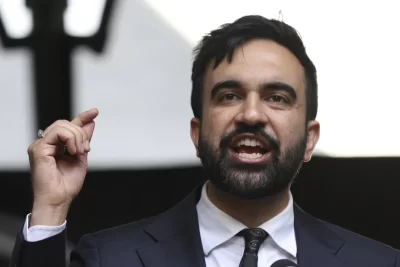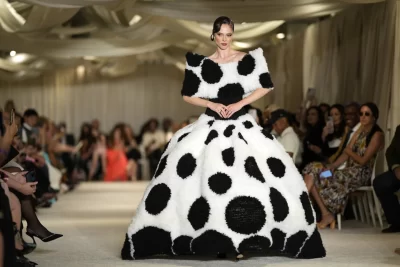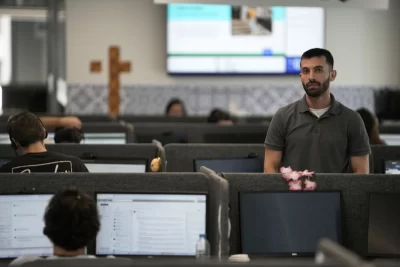
NEW YORK — Prosecutors said Thursday that Donald Trump again violated a gag order in his hush money trial, as the criminal case resumed on the same day that the U.S. Supreme Court weighed whether he should be immune from prosecution for actions taken during his time as president.
Judge Juan M. Merchan was already considering whether to hold Trump in contempt and fine him for what prosecutors say were 10 different violations of the order that barred the GOP leader from making public statements about witnesses, jurors and others connected to the case. Then the prosecution ticked off fresh instances of suspected breaches.
What to know about Trump’s hush money trial:
Trump trial live updates: Testimony set to resume
Trump will be first ex-president on criminal trial. Here’s what to know about the hush money case.
A jury of his peers: A look at how jury selection will work in Donald Trump’s first criminal trial.
Trump is facing four criminal indictments, and a civil lawsuit. You can track all of the cases here.
Assistant District Attorney Christopher Conroy pointed to additional remarks that Trump made about key prosecution witness Michael Cohen, Trump’s former attorney, when talking to reporters outside the courtroom and in other interviews. He also noted a comment Trump made about the jury being composed of “95 percent Democrats,” among other things.Meanwhile, with the Supreme Court arguments happening in Washington, and Trump’s former lawyers and associates freshly indicted in a 2020 election-related scheme in Arizona, the former president was again in a seemingly tight legal spot. But Trump has a long history of emerging unscathed from sticky situations — if not becoming even more popular — particularly to his loyal supporters.
Former President Donald Trump sits at the defense table while David Pecker, shown on the video screen, testifies about Karen McDougal in Manhattan criminal court, Tuesday, April 23, 2024, in New York. (Elizabeth Williams via AP)
Former President Donald Trump sits at the defense table while David Pecker, shown on the video screen, testifies about Karen McDougal in Manhattan criminal court, Tuesday, April 23, 2024, in New York. (Elizabeth Williams via AP)
Trump asked to skip the New York proceedings for the day so he could sit in on the high court’s special session, where the justices weighed whether he can be prosecuted over his efforts to reverse his 2020 election loss to Joe Biden. His request was denied by Merchan, who is overseeing the trial on the hush money scheme that was allegedly meant to prevent harmful stories about Trump from surfacing in the final days of the 2016 campaign.
“I think the Supreme Court has a very important argument before it today,” Trump said outside court. “I should be there.”
Though entirely separate cases, the proceedings were jumbled together in one big legal and political puzzle that had implications not just for the presumptive Republican presidential nominee but for the American presidency writ large.
Activist Stephen Parlato of Boulder, Colo., right, joins other protesters outside the Supreme Court as the justices prepare to hear arguments over whether Donald Trump is immune from prosecution in a case charging him with plotting to overturn the results of the 2020 presidential election, on Capitol Hill in Washington, Thursday, April 25, 2024. (AP Photo/J. Scott Applewhite)
Supreme Court seems skeptical of Trump’s claim of absolute immunity but decision’s timing is unclear
Former president Donald Trump, center, awaits the start of proceedings at Manhattan criminal court, Monday, April 22, 2024, in New York. Opening statements in Donald Trump’s historic hush money trial are set to begin. Trump is accused of falsifying internal business records as part of an alleged scheme to bury stories he thought might hurt his presidential campaign in 2016. (AP Photo/Yuki Iwamura, Pool)
Trump could avoid trial this year on 2020 election charges. Is the hush money case a worthy proxy?
Former president Donald Trump waits for the start of proceedings in Manhattan criminal court, Tuesday, April 23, 2024, in New York. Before testimony resumes Tuesday, the judge will hold a hearing on prosecutors’ request to sanction and fine Trump over social media posts they say violate a gag order prohibiting him from attacking key witnesses. (AP Photo/Yuki Iwamura, Pool)
Tabloid publisher says he pledged to be Trump campaign’s ‘eyes and ears’ during 2016 race
In both instances, Trump is trying to get himself out of legal jeopardy as he makes another bid for the White House. But the outcome of the Supreme Court case will have lasting implications for future presidents, because the justices will be answering the never-before-asked question of whether and to what extent does a former president enjoy immunity from prosecution for conduct alleged to involve official acts during his time in office.
The high court’s decision may not affect the New York City case, which hinges mostly on Trump’s conduct as a presidential candidate in 2016 — not as a president. He faces 34 felony counts of falsifying business records in connection with hush money payments meant to stifle embarrassing stories from surfacing. It is the first of four criminal cases against Trump to go before a jury.
Trump has maintained he is not guilty of any of the charges. In New York, he says the stories that were bought and squelched were false.
“There is no case here. This is just a political witch hunt,” he said before court in brief comments to reporters. He also criticized Biden’s policies and talked about his upcoming campaign events in New York.
Trump then he walked to the defense table, stood briefly and whispered into lawyer Todd Blanche’s ear before sitting down.
The trial resumed with fresh talk over possible gag order violations. Conroy argued that in the comments about Cohen, Trump described his now-disbarred former personal attorney as a liar and a lawyer who “wasn’t very good, in a lot of ways, in his representation.” Cohen pleaded guilty in 2018 to federal charges that included lying to Congress and a bank.
Conroy also mentioned statements Trump made just Thursday morning about the Manhattan district attorney’s first witness, David Pecker, former publisher of the National Enquirer and a longtime friend of Trump’s who pledged to be his “eyes and ears” during his 2016 presidential campaign.
When asked during a morning campaign stop what he thought of Pecker’s testimony so far, Trump responded: “David’s been very nice, a nice guy.”
Conroy characterized the comments to the judge as a warning to other potential witnesses that Trump has a platform and will use it to attack them if they aren’t kind to him. Conroy characterized the comments as “a message to Pecker: be nice.”
Trump was dismissive about the looming decision. When asked by reporters if he would pay the $1,000 fine for each of 10 posts if he so ordered, he replied, “Oh, I have no idea.” He then said, “They’ve taken my constitutional right away with a gag order.”
Meanwhile, jurors started their day with more witness testimony from Pecker, who has already explained how he and his publication parlayed rumor-mongering into splashy stories that smeared Trump’s opponents and, just as crucially, leveraged his connections to suppress seamy stories about Trump, including a porn actor’s claim of an extramarital sexual encounter years earlier.
As the 12-person panel watched attentively, with some appearing to take notes, Pecker recalled receiving a telephone call from Trump during the tabloid’s pursuit of former Playboy model Karen McDougal’s claims of an extramarital affair with Trump.
Trump, too, watched intently as his friend spoke from the witness stand.
Pecker was at an investor’s office in New Jersey, giving a presentation, when an assistant interrupted and said Trump was on the line, the ex-publisher testified.
“When I got on the phone, Mr. Trump said to me, ‘I spoke to Michael. Karen is a nice girl. Is it true that a Mexican group is looking to buy her story for $8 million?’ I said, ’I absolutely don’t believe there’s a Mexican group out there looking to buy her story for $8 million.’”
Trump then asked Pecker what he should do, the ex-publisher said. Pecker testified that he told Trump, “I think you should buy the story” and keep it quiet.
“I believed the story was true,” Pecker explained. “I thought it would be very embarrassing to himself and to his campaign.”
Pecker said she demanded $150,000 — plus writing assignments and other business opportunities — for the rights to her story. But according to Pecker, it wasn’t clear who was going to pay for it.
Pecker said Cohen, acting as Trump’s attorney, initially asked him to front the costs.
“I said, ‘Michael, why should I pay? … Now you’re asking me to pay $150,000 for the Karen story, plus all of these other additional items that she wants to do.’”
When asked how he would be reimbursed, Pecker said Cohen assured him: “Don’t worry about it. I’m your friend. The boss will take care of it.”
A conviction by the jury in the hush money probe would not preclude Trump from becoming president again, but because it is a state case, he would not be able to pardon himself if found guilty. The charge is punishable by up to four years in prison — though it’s not clear if the judge would seek to put him behind bars.
At the Supreme Court, the arguments are related to charges in federal court in Washington, where Trump has been accused of conspiring to overturn the 2020 election. The case stems from Trump’s attempts to have charges against him dismissed. Lower courts have found he cannot claim immunity for actions that, prosecutors say, illegally sought to interfere with the election results.






